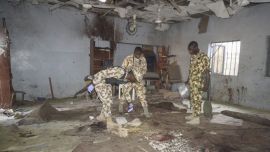Some companies in Argentina are suspending sales ahead of the presidential election Sunday, fearing another major currency devaluation that would wipe out revenue.
From car parts to construction and even toilet paper, firms big and small are holding their breath as key aides to competing candidates contradict each other over the peso’s fate.
On Wednesday, Carlos Melconian, economic adviser to opposition candidate Patricia Bullrich, predicted the official exchange rate would devalue to 500 pesos per US dollar from 350 currently. That prompted the ruling coalition to fire back hours later, insisting there’d be no devaluation next week or anytime soon. Meanwhile, frontrunner Javier Milei openly encourages Argentines to stop saving in pesos because he plans to dollarise the economy.
Expectations of a peso plunge are extra high because presidential candidate and Economy Minister Sergio Massa devalued the currency by 18 percent the day after Argentina’s primary vote. But since then he’s frozen the official rate, leading to widespread public speculation of another devaluation after the general election as the peso continues to sell off in the parallel market, recently topping 1,000 per dollar.
“It’s practically impossible to finalise purchases this week — everybody’s waiting on the election results,” said Juan Pablo Rudoni, head of modular construction company EcoSan, whose suppliers canceled orders after previously confirming with receipts. “Depending on the results, I think next week is going be tough too.”
Rudoni isn’t alone. Auto shops received notice from suppliers this week that they can’t order new parts until after the October 22 vote. US giant General Motors ordered a temporary production halt in Argentina last week due to lack of imported components. A factory outside Buenos Aires that sells paper towels and toilet paper also notified the small businesses it serves that sales will be suspended the entire week after the election.
In Argentina’s northern Jujuy Province, local media reported gas stations suspending sales as customers attempted to load up on fuel before a possible devaluation. In the country’s south, computers and other electronics aren’t available in Patagonia’s Neuquén province while grocers and supermarkets in the farming province of Chaco are already warning that some suppliers aren’t selling until after the vote.
All the suspended activity is “incipient pre-hyperinflation behaviour,” according to another Bullrich adviser.
“It reflects the government’s fiscal jubilee and the dollarisation prophecy,” Eduardo Levy-Yeyati said on social media, criticising Massa and Milei. “Hopefully the results Sunday help to calm the situation.”
by Patrick Gillespie, Bloomberg



















Comments